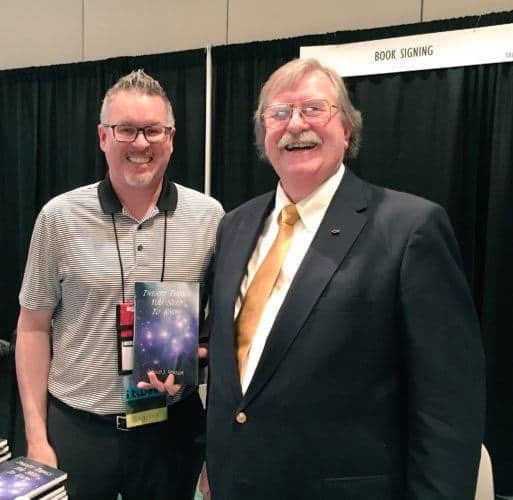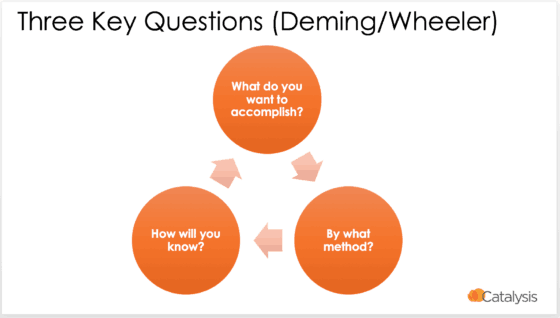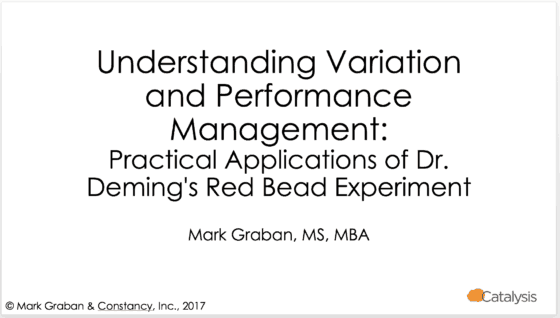Today's Post in <50 words: I recently got to meet Prof. Donald J. Wheeler when he gave a keynote talk at the Society for Health Systems Conference. Check out his book Understanding Variation and learn more about him in this post.
Over the years, I have been pretty fortunate to meet some authors I have learned a lot from and really admire.
I first met, or I should say “saw,” Jim Womack when he gave a talk to a class at MIT in 1998 or so, but I didn't get to talk one-on-one. I did some podcasts with him starting in 2006, but hadn't really met in person. I finally got to talk with him in 2007 when I attended the Lean Healthcare summit that was hosted by Dan Jones and the Lean Enterprise Academy in the UK (that was my first chance to talk to Dan, also).
Jim said something, as is his dry style, to the effect of, “It's good to see you are a real person” after emailing and talking via podcast.
It was at this same event when I first met Dr. John Toussaint. I had a foot-in-mouth moment when I asked something about his hospital system in Minnesota (oops, it's Wisconsin, of course).
In 2012, I had a chance to meet and talk with another “living legend,” Masaaki Imai:
Notes from Meeting Masaaki Imai and Hearing Him Talk about Kaizen (Continuous Improvement)
One reason I was excited to attend last week's Society for Health Systems conference was the chance to hear Donald J. Wheeler give a keynote talk at the event.
He is the author of a great book called Understanding Variation: The Key to Managing Chaos.
I've called this my “favorite book ever” and have written about that:
The Book that Changed Me: “Understanding Variation” by Don Wheeler
I have to thank my dad, Bob Graban, for helping expose me to Dr. Wheeler's work. My dad was an engineer at General Motors for 40 years and took a course that Dr. Wheeler taught (or saw a short talk). This was probably in the late 1980s, when I was still a kid at home.
He had a copy of Understanding Variation and it later (during college?) caught my interest (much as I had learned about Dr. Deming and Out of the Crisis thanks to an opportunity my dad had at GM to talk his famed four-day seminar).
I wasn't the only SHS member who was excited about his talk:
Who's excited about Dr. Don Wheeler's #SHS2017 keynote this Friday? I know I am! @lhess916 @LauraSilvoy #MightAsWellBeAStarTrekConvention pic.twitter.com/mnHCQa11Ic
— Isaac B. Mitchell (@IsaacMitchell) March 1, 2017
Isaac Mitchell, who shared the tweet above, was also excited about the day. Being from Tennessee, Isaac had met with Dr. Wheeler before at the University of Tennessee, I believe.
Before the talk, Dr. Wheeler was in the exhibit area, where he was giving away and signing copies of the book that's an addendum to Understanding Variation, a book called Twenty Things You Need to Know.
When he had some downtime, I was able to chat with him one-on-one for a while. I was excited and respect him a lot, so I didn't want to come across like too much of a “fan boy” and I didn't want to say something dumb… and I was trying to make sure he really had time and I wasn't bothering him or distracting him from getting ready for his speech (he was very welcoming and kind… I was just being nervous).
I learned that he first met Dr. Deming in 1972 and Deming had taught some guest lectures at Tennessee.
We talked about the healthcare system, examples where people overreact to common cause variation, and the Oscars.
I was able to get this picture with him:
I really enjoyed his talk… here are some tweets and other notes I had taken about his key points (there was a lot of wisdom packed into that hour, along with some humor… and you can get a lot of that out of Understanding Variation.
Wheeler #SHS2017 – all data is historical. How do we make predictions about the future based on that? pic.twitter.com/LWOdqLHqJx
— Mark Graban (@MarkGraban) March 3, 2017
Wheeler #shs2017 – "The USA Today has predicted 15 of the last 3 downturns in the stock market." This hardcore stat geek humor.
— Mark Graban (@MarkGraban) March 3, 2017
Wheeler #shs2017 "The voice of the process is talking to you… are you listening?" #Deming #Lean
— Mark Graban (@MarkGraban) March 3, 2017
Wheeler #shs2017 "The question is not whether these [SPC] methods work… only if you can make them work." Just like #Lean, I'd say.
— Mark Graban (@MarkGraban) March 3, 2017
To elaborate on that… it's been proven that Lean methods can have a very positive impact in healthcare. That doesn't mean Lean is easy or that it's guaranteed to work.
Wheeler #shs2017T "SPC is a way of thinking, with some tools attached." (again, just like #Lean)
— Mark Graban (@MarkGraban) March 3, 2017
Wheeler at #shs2017 — #Deming's 3 questions: What do you want to accomplish? By what method? How will you know?
— Mark Graban (@MarkGraban) March 3, 2017
He had an illustration in his slides, but I created my own for my workshops and other purposes:
Wheeler #shs2017: "Those who do not use process behavior charts have no advantage over those who can't!" (also applies to #Lean?)
— Mark Graban (@MarkGraban) March 3, 2017
There are more notes I could share… maybe I'll write another post. I do encourage you, as always, to buy his book and read it: Understanding Variation: The Key to Managing Chaos.
Today, I'm teaching a workshop in Brussels that's based heavily on Dr. Wheeler's work, Deming's Red Bead game, etc.:
I'm doing this workshop, or a continuously improved version of it in Seattle this May and at the Lean Healthcare Transformation Summit in Palm Springs this June.
Please join me!
Here is a post I wrote earlier this year on the topic:
Better Metrics & “Understanding Variation” – An Important Topic for Healthcare
And this previous post about the Red Bead Game:
Running Dr. Deming's Red Bead Experiment & the Implications for Healthcare
What are your thoughts on Dr. Wheeler and his work, if you're familiar with him and his books?
Please scroll down (or click) to post a comment. Connect with me on LinkedIn.
Let’s build a culture of continuous improvement and psychological safety—together. If you're a leader aiming for lasting change (not just more projects), I help organizations:
- Engage people at all levels in sustainable improvement
- Shift from fear of mistakes to learning from them
- Apply Lean thinking in practical, people-centered ways
Interested in coaching or a keynote talk? Let’s talk.
Join me for a Lean Healthcare Accelerator Trip to Japan! Learn More













Dr. Wheeler’s work has helped me a great amount. One of the main things I learnt is we can extract nearly all we need from a good picture of the data. In Understanding Variation on p. 121 of my edition you find:
– Questions about signals lead to improvements
– Questions about noise merely create chaos
Not bad advice!
Good article, Mark. Love the comment, “Putting out fires is not improvement.” We agree on many fronts… in fact, one of our past newsletters focused upon similar ideas, and was entitled “Discontinuous Improvement.”
Comments are closed.